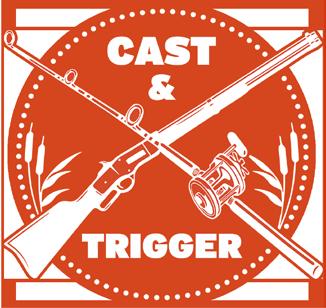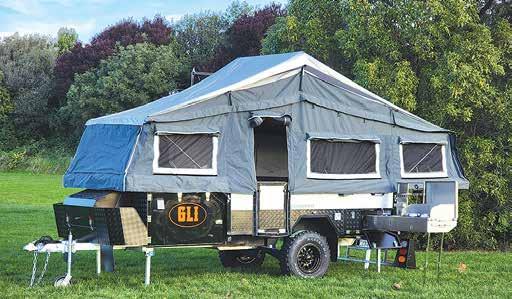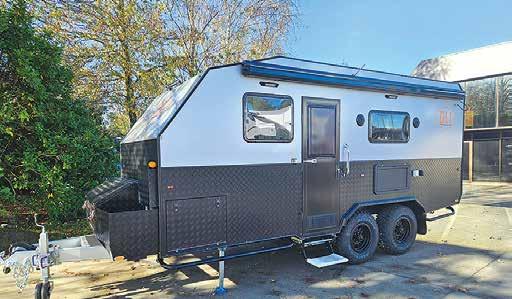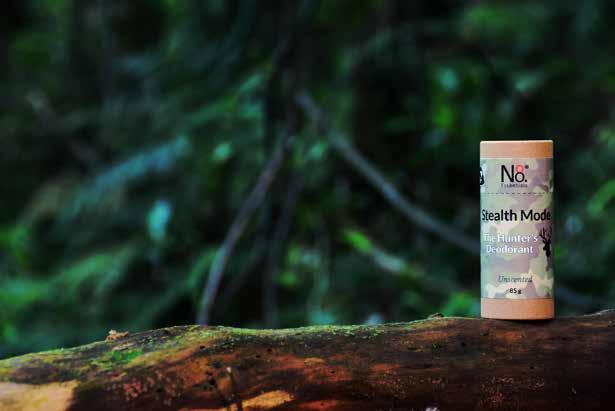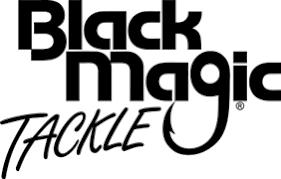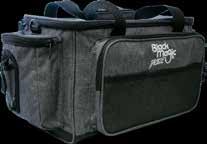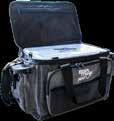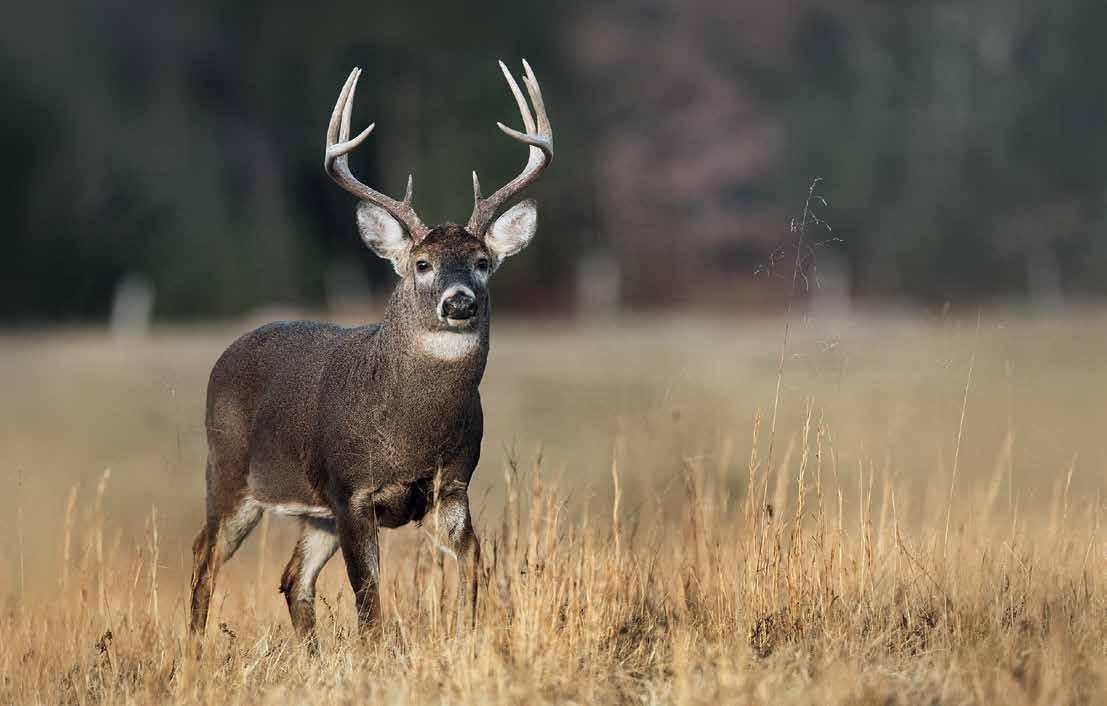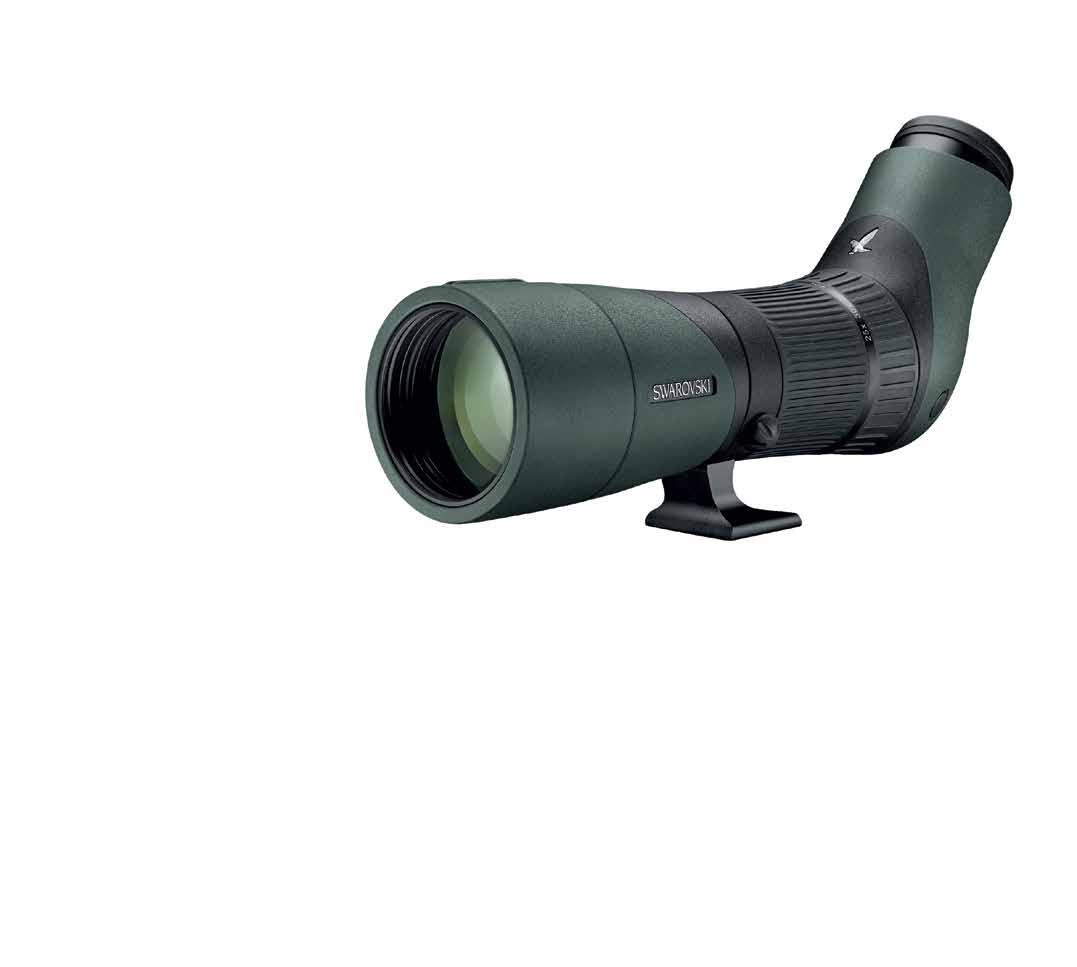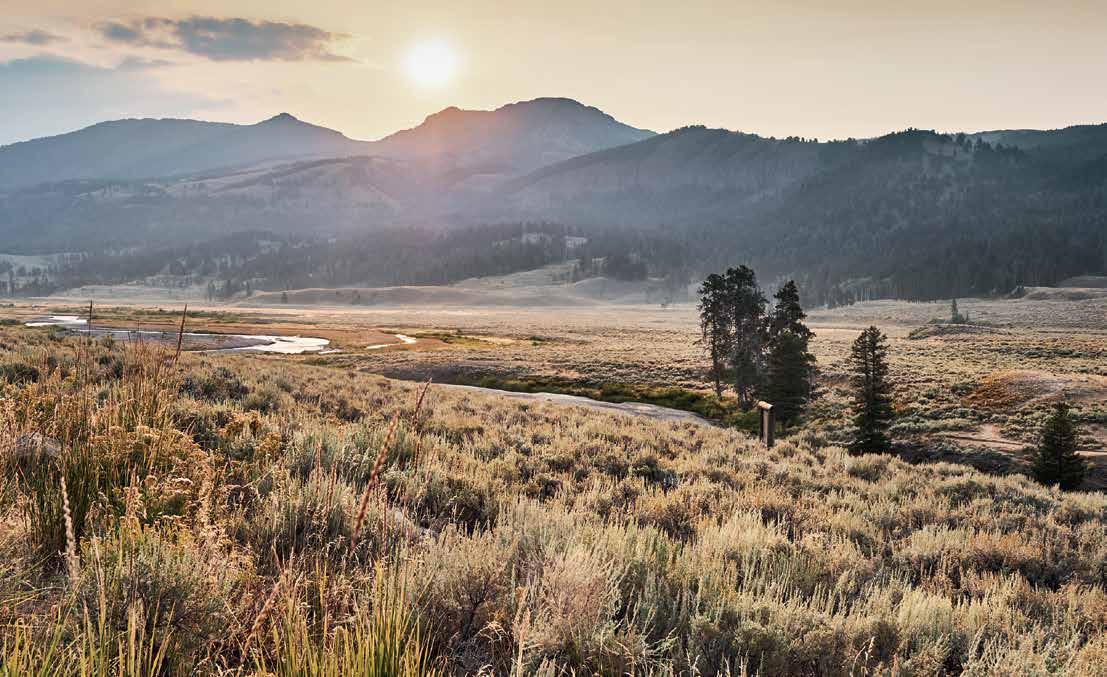








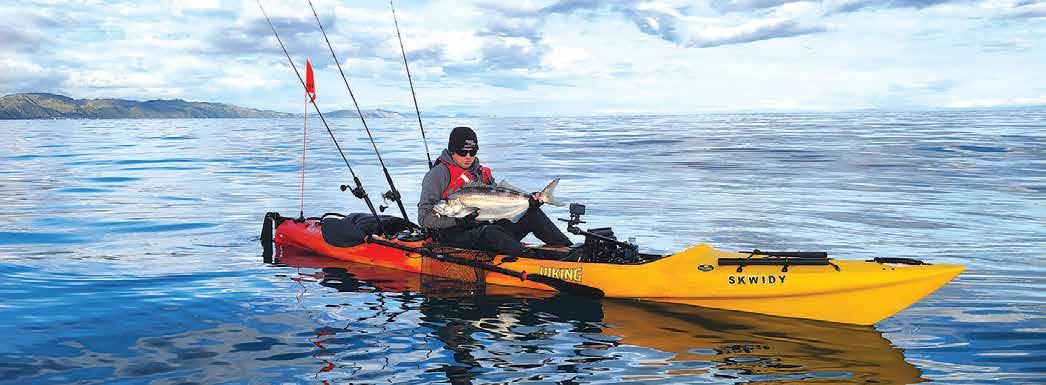
Blue moki is a species I have had a love hate relationship with over the been spent on the beach
With the recent introduction of Fishbites (a tough synthetic bait), blue moki have become a much more common catch
right around the country. Fishbites come in many and blue moki absolutely love them. These baits last a long time due to a mesh in the middle of the bait that helps the hook to stay in. While on a trip off the Kapiti Coast I was drifting in deep water, slow-jigging for snapper. I chose to actively ledger rod to drag out behind further behind the boat.
A collection of pig-hunting stories from veteran Kiwi hunter/ hunting author Kim Swan, whose nine previous titles were published by Halcyon Press. Each short chapter recounts an engaging pig-hunting tale full of action, humour, triumphs and disappointments.
Available at all good book stores and online Only $39.95
Suddenly my ledger rod bent right over into the water and the poor reel screamed in agony as something massive tore off to the south. I struggled to get the rod out of the holder and settled into to tow the kayak south at 1.5 km/h directly into the current. Outputting this much power, it had to be something serious.
Heavy tail beats telegraphed through the rod as I attempted to lift the

the league of the late Barry Crump and leading the pack of contemporary writers. Her unique yet natural writing style and whimsical narrative bring a charm to her stories that capture the hearts and minds of hunters and non-hunters alike-a true gift. Kim’s stories have proved a popular staple for The Fishing Paper & Hunting News readers for well over a decade.
gems and one of life’s lovely people to boot! This book deserves a treasured spot in your library; it won’t disappoint.”
Crimpy

“Had I lived long enough to read Kim’s work, I would have been impressed by her tight narrative, delightful prose and originality. I may have even learned a thing or two about spinning a good yarn. If I were alive today, and
Ernest HemingwayEvery time I’d get a wind three more. I could only hope that there was no reef down there to get hung up on.
Little by little, I made ground and a very large silver shape popped up in front of the kayak, sending me scrambling for the net. At the time, I had no idea this would be a blue moki so seeing this surface sent me into shock. The net slipped
and, after trying to lift it into the boat, I realized how much of a giant it really was.
The moki was full of life as I popped it onto my lap for a quick photo, almost winning its freedom in a split
a grip onto its very broad tail as it was about to slip away. The moki measured 74 centimetres, which puts it at an estimated weight of 16 pounds.
Even though I had pulled of 50 metres depth, the moki was seemingly unbothered by the pressure change and happily kicked out of my hand as I cradled it in the water for release. Sending a jet of water to the surface, down to live for another day. It’s safe to say, this blue moki will be very tough to
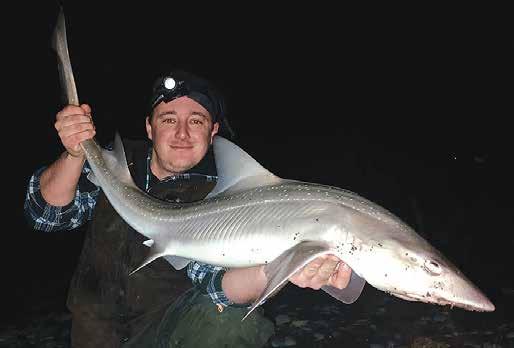
running HARD.
red cod, carpet shark
Then a long quiet period with no bites.
Then my rod started twitching; the bait was attracting bites. I was using a small paddle crab on a
should have been tempting.
“Red cod,” my mate yelled as I sprinted toward the bending rod. I wound the slack out, bent the rod tip down and felt some light tugging so went for a big strike. The hook set, I started reeling it in. It did feel a red cod; just a wee bit of dead weight.
However, once I dragged it near the shore, my rod suddenly bent right over and line started PEELING OUT—
“Can you hear that?” I yelled to my mate who was 20 metres away. The reel was screaming. I didn’t think he would have heard it over the waves but, much to my surprise, he yelled back saying, “YEAH!”.
After a few minutes of
no red cod—just a good rig. That makes it four successful trips in a row—better than a hat trick!
No less than three years after we began investigating concerns of over-fishing in Fiordland, we are pleased to announce new recreational fishing rules for the Fiordland (Te Moana o Atawhenua) Marine Area. This is the biggest change to fishing rules in the area since the Fiordland Marine Guardians began in 2005 and is a stellar example of local people developing solutions for local problems.
The Guardians’ recommendations to the Minister of Oceans and Fisheries followed a 2022 review, where feedback showed support for changes to rules to help protect the area from increased fishing
pressure, particularly around the fiord entrances.
The Minister for Oceans and Fisheries, Hon Rachel Brooking, recently approved our recommendations following public consultation. We would like to thank those who assisted with our review and critical analysis of our proposal by participating in workshops, attending public hui, contacting us directly and making written submissions during the consultation process. We learnt a lot during the process, and believe the result is stronger than our initial proposal thanks to the constructive feedback we received.
In brief the changes will:
• reduce daily species and
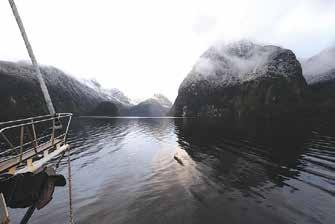
bag limits for many finfish and shellfish species within the fiords.
• introduce a Fishing Line at the entrance of each fiord to reduce the pressure on species in the fiord entrances and encourage fishing on the outer coast.
• close the oyster and scallop fisheries in Fiordland.
Most of the changes are expected to be in place for the coming summer. Without doubt, the most feedback we received related to rock lobster/ kōura. We took this feedback on board and as a result there will be no change to the amateur fishing rules for spiny and packhorse species.
We will continue to advocate to the government for mandatory recreational reporting based on the strong support expressed during public consultation. Here’s a chance for us to prove how informative and powerful data can be in guiding fisheries management. We ask fishers to download the app Mainland Catch and start recording your catch. The
data will support our future review of the e ectiveness of these rules in improving sustainability of key stocks. During the consultation process a couple of ideas were proposed the Guardians consider having merit. There was feedback there should be restrictions on ‘bulk’ harvesting methods such as cod potting, longlining, and set lining by both recreational and commercial fishers inside the new Fishing Line. Submitters also raised concerns about the potential for vessels with large fishing parties onboard to contribute to localised depletion of fish stocks. The introduction of boat limits (a limit on the total number of fish and shellfish taken per vessel) was proposed to reduce this risk.
We consider there is a need for focused discussion on these two proposals and the minister agrees, having instructed Fisheries New Zealand to go out for further consultation. The proposals in full and details on how to make a submission can be found on the Fisheries New Zealand website. The consultation period closes on Monday 28 August. We
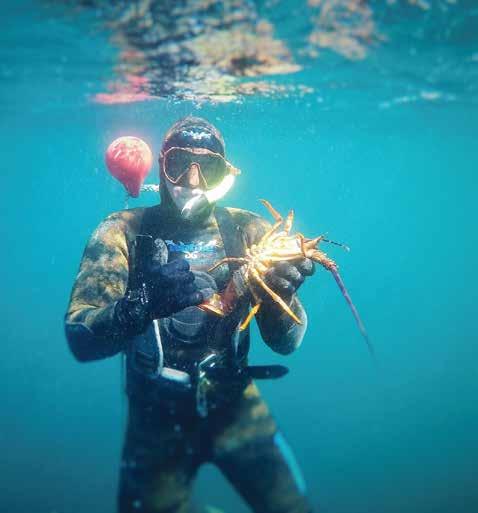

encourage anyone with an interest (recreational or commercial) to provide feedback on the proposals.
The Guardians are looking forward to The Rock Southland Boat Show in Invercargill over the weekend of August 12-13.
Track us down to have a chat about the new rules and the proposed gear restrictions and boat limits. We’ll be lurking around by the Harbour

And
with privilege comes responsibility.
As a group, we’re responsible for managing and caring for Fiordland’s precious marine environment. Before you venture into Fiordland ask a local. Collectively, the Fiordland Marine Guardians represent the knowledge/mātauranga and experience of Fiordland users. Whether it’s about safe anchorages, fishing regulations, or requirements for a Clean Vessel Pass for Fiordland, connect with us at FMG.org.nz

As part of the Moana Project, hundreds of commercial fishers around New Zealand are collecting vital temperature data from below the sea surface. The data help fishers make sense of their catch and helps scientists understand our oceans.
Dr Julie Jakoboski from the MetService who leads the sensor programme says: “Thanks to commercial fishers, we have a window into ocean temperature below the surface that we’ve never had before. Since the sensor programme started, ocean temperatures around New Zealand have been abnormally high. Thanks to fishers, we now understand what is going on beneath the surface.
The data collected by fishers show that temperature at depth can be very di erent from those at the sea surface,” she continues. “For example, we recently analysed sensor data from the Bay of Plenty and found that temperatures at around 60m depth were much warmer than the average, even when sea surface temperatures were normal.”
New Zealand gets ocean temperature data from an international programme using drifting sensors called Argo. However, these drifters are meant for deep water and don’t enter our coastal seas, the area most important to our blue economy.
“Fishers operate in exactly the area where we don’t get data from international monitoring programmes,” explains Julie. “Altogether, through the sensor
programme, fishers have collected an astounding 16 million temperature observations from the coastal and shelf seas. This data provides a vital window into what is going on in our coastal environment, where most fishing, aquaculture and tourism is based.”
The last few years, New Zealand marine heatwaves have broken all records, which has significantly a ected aquaculture and other marine life, causing dieback of bull kelp, sponge bleaching, and impacts on seabirds and marine mammals.
The impacts of warmer than average ocean temperatures are not just felt at sea. Warmer oceans can help fuel ex-tropical
cyclones in New Zealand waters, potentially causing more intense rainfall like what we experienced in Gabrielle.
Julie continues: “The sensor programme is funded until 31 March 2024, but we are currently seeking funding to keep the programme running. Ocean data is super valuable and thanks to commercial fishers, New Zealand is leading the world when it comes to coastal temperature data.” Have you noticed something that you think is caused by higherthan-average ocean temperatures? Fishers are close to the ocean, and we are looking for firsthand reports on potential


Call Malene on 021 298 0898 or email malene. felsing@metocean.co.nz
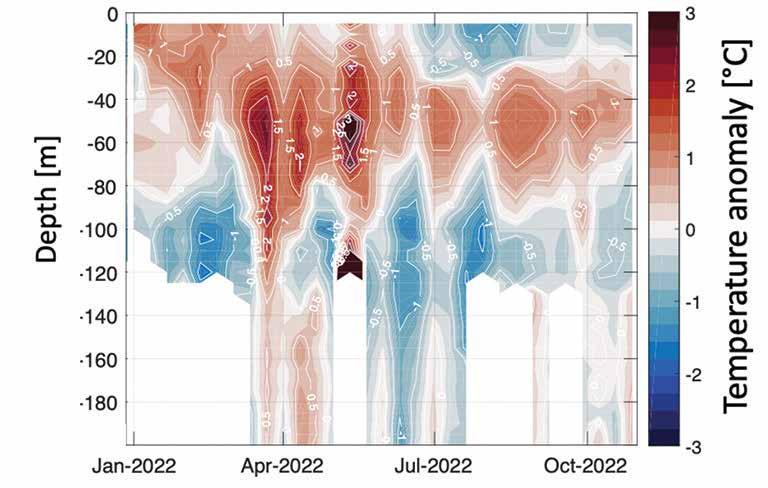





an oldie and somewhat overused.
“I’ve been awake all night, really tired, sorry won’t be able to make it”—awww, are you tired? Me too—always!
“There’s wintry weather forecast, don’t want to get a cold”—oh dear me, no, couldn’t have that could we.
This morning’s excuse from a person I’d invited is, “But it’s raining.”
So it is, light rain, no breeze, poor visibility and bloody cold too. Not ideal hunting conditions when you’re running dogs but when you are a genuine pig-dogger and you have just one day, then no headache, you getting out and amongst it.
I’m alone then, aside from my canine mates, as I exit my ute and drag on my wet weather gear. Despite the damp and the chill, I’m happy to be out and in such company. Keen and honest, my dogs don’t get headaches or fear a forecast less than perfect.
In no time at all I’m wet to the skin, blinking the salty combination of sweat and rainwater from my eyes. Steam rises from me as
my hard-working muscles produce heat and each exhalation is a plume of moisture-laden-silver. Yes, it’s cold, but what’s not to love:the silence, the sweet contact and tail wags of loyal pig dogs.
After a long trek through out into younger trees.
Pearl is away and Chop and Nugget have picked up the pace. The cloud is so low I cannot see anything bar the closest of views but I press on, a route in mind, which will take us through piginfested country.
Pearl makes a comeback but only momentarily. She begins to circle, nose to the ground, desperately trying to lock on to a hot scent and a single trail. A quick glimpse at my tracker shows the boys are straight lining in the opposite direction. I try to get Pearl’s attention, to get her straight lining after her mates, but she’ll have none of it. A girl’s gotta do what a girl’s gotta do and this old girl is beginning her own journey right this very instant.
Far below me I hear Chop bark, his language is telling me, “Boar on but not behaving.”
He and Nugget are
struggling, perhaps a pig too big to comfortably hold but too aggressive or agitated to bail.
Time is critical. A glance at the tracker shows Pearl contouring away very rapidly. She will not hear the boys, nor come to their aid. If I leave her, I will not hear her when she catches her pig, nor will I come to her aid. Well, she hasn’t caught her quarry yet, so I opt for the ‘bird in the hand,’ a descent of hundreds of metres to the boys and boar in a life and death struggle.
us is a defunct barbedwire fence interwoven with lawyer and porcupine shrubs. Believing I’ll save instead of around it, I scale the topside and awkwardly leap off the wobbly wire. dismount of my lifetime— and not very clever either. A long rusty barb of sharpened wire punctures the joint of snagged, yeeow! Who would believe such a small puncture could hurt so much. But it does and when I free my pinkie, it bleeds and bleeds. There is not a moment to waste though and self-sympathy is in short supply.
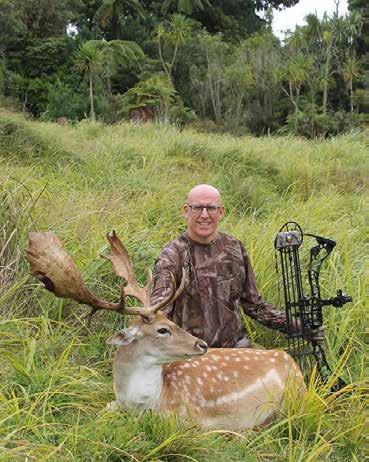



The route ahead is gnarly and steep. Rain piddles down and every branch I grab to prevent headlong somersaults or uncontrolled nosedives then douses me with even more water. Hidden rocks lie in wait and poor wee pinkie drips blood all the while.
As I approach the boys, Chop’s bail barks are squeaky with desperation. He and Nugget are exhausted, but they cannot catch their breath nor let up. The moment Nugget releases his grip, the boar begins to jog away. Even in the short time it takes me to close the scope of water and debris, the boar makes another 20 metres.

No.8 bow strings epitomise New Zealanders can-do approach to life.
Designed by Advanced Archery’s Carol and Kevin Watson for our rugged conditions and made right here in New Zealand. We’ve refined the latest string building techniques, equipment, and materials we use through constant field testing to get the string quality we’re excited about.
Go Kiwi with all black or choose from thousands of colour combinations with clear serving to customise it your way.
Pre-stretched for zero peep rotation, with speed buttons installed and a bow tune, we’ll send your bow back to you shooting as good as new, maybe even better!

Sensing I am here, Nugget goes to work once more.
the hock, turning it before the pair of them rise onto their hind legs, each trying to dominate the other. They topple over and crash into a wild currant bush atop a high bank. A quiet word to Nugget, I ask him to release his grip and give me my time. The scope is blurred, the target indistinct, but the
The boys and I catch our breaths but only for the time it takes me to rouse the tracking device from its pouch. Sure enough, Pearl is showing as ‘treed’ high up on a densely vegetated ridge above us. So now it is me who begins to jog, the
knackered, the saturated and weighted with wares and gear and worry. Alas, my best intentions are in vain. High above shot, the resounding boom and dampened echo that followed. Reluctantly she turned her back on her quarry and came our way. There is a reunion a while later, me and three bedraggled and bloodied buddies go back to the dead boar and he is then disemboweled and dragged out to the road—a happy ending bar the pinkie, which, ultimately, cost far more time today.

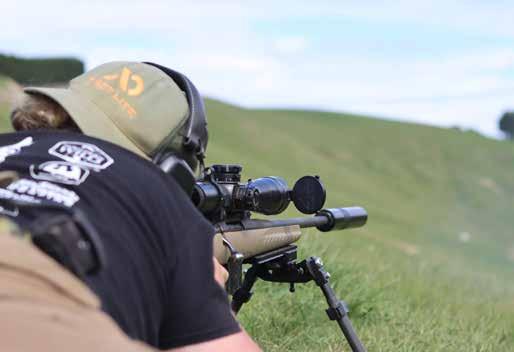
We have two multi calibre suppressors available in the hybrid model and this is possible because the hybrid ba e system has tight tolerances allowing the small ranges of calibre. The hybrid ba e system also lowers the risk of stray bullets and bullet strike
• The first is suitable for 22 Hornet through to 243 including, 222, 223, 22-250, 243.
• The second suppressor is suitable for 6.5 through to 30-06 including 6.5 prc, 270, 7mm-08, 284, 280, 308, 7.62 x 39 etc (not including 300 PRC or belted magnums).
• 9” in length (230mm), sits 4” forward & 5” back over the barrel (this is a “fixed” length and cannot be changed or added to)
• Weight 360 – 370grams (alu internal muzzlebrake 5-6,000 rnds)
• Colour - Black

most important vote for
shooter, have met some great friends through it and been lucky to represent New Zealand several times. The issues are complex and layered.
licence holders is the issue I’m basing my vote on, due to the poor treatment of my friends and I, the clubs and those who give their time to help run these clubs. The clear message is, certain political parties want to stop private ownership of this and not just because I am a very keen pistol

It had been a while and
over all this but no, I needed
Take for example, animal welfare. I don’t believe anyone should be allowed to have stock, no matter how many, or the size of your land holdings, without the ability to put an injured or sick animal down in order to stop it suffering. This is very important in my opinion. Leaving an animal to suffer while a careless owner tries
do what they should have been able to do quickly and
If people really cared, they would be supporting a government that has a
ownership and usage, which is the opposite to the current political climate.
With the cost of food as it is, hunting for the table is becoming very important— not to mention the need to control wild animals and
ownership being challenged so much? Firearms are an important tool for a lot of people and an integral part of our unique Kiwi culture— the nation was founded on the right and ability to hunt and gather.
The media likes to make headlines; sensationalising shootings and putting a
’bread & butter’ and they do their best to make every little story bigger and worse than

the last. So much so, many have lost faith in their story telling, because it hasn’t been real news for a long time.
Most of our troubles started after the Christchurch shooting and all bar one politician turned on us like mad dogs. Most wouldn’t even talk to the shooting
groups but went ahead through. One admitted to me he didn’t really understand what he voted for, then tried to say it was political suicide not to— that’s BS.
David Seymour from ACT didn’t see it that way and, in the next election, ACT went
from one seat to 10 strong. For me, its party vote ACT, as I want them stronger still and we do need a change of government. Do I agree with everything he says? Nope, but I can live with that as those I have met from the ACT team seem to be real working people—not just politicians.
Matey was at the gate at half eight and we had a clean run up to a secret lake, a little west of that well known Coast
location, Waikikamukau. Unfortunately, there was a northerly blowing through the mountains as we buffeted our way across the water.

Both of us got a lot of spray on ourselves but we made it to the selected spot, only
along onto stumps, sand bars and used car bodies.
It’s a rugged wee lake. There was little chance to we also ended up becoming severely bogged. After grabbing the oars and using them to pole like an Avon River punter, I dropped the motor to half-mast and we began to make some progress. We churned through the mud, the blood and the beer, saying, “Sod this, let’s go back to good old faithful Brunner.”
Having splash-bashed our way back to the ramp, we saw calmer water in the lee of the bush line along the shore, so focused on that. The sun on the still water produced an interesting transparent Spey Valley product colour (I think
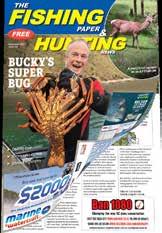
Crimpy will readily identify with that).
Fish took without hesitation, mostly unseen till the strike happened. Matey picked up a three pounder, missed another, while I caught a feisty little beastie that shouldn’t have been away from its Mammy so was released. Matey got another very nicely conditioned number, meaning he had his limit.
a second one, which I reckoned was fairly small, well for a start. Luckily, it headed strongly out into the lake away from the fallen tree snags and rocks around the edges where we like to times and was brought to the net where it also proved to be rather nicely conditioned.
I lost another one which prompted Matey to recall the time I gave him a replacement pattern for the
one he’d just lost and after
the barb. A few barbed comments followed but I swear it wasn’t intentional your honour!
At one stage, I got a nice entanglement in my leader so messed with that for 10-15 minutes. After that, we took lunch then drifted nooks and crannies. Later we decided we‘d done well for the day in spite of the conditions, in fact, away from the sheltered edges there had been more wind than ‘Mick the Master Farter’ could produce after a night of beans and beer.
Back to the ramp and with the boat on the trailer we discussed on the way home once more how we live in a wonderful region with so many lakes and wild rivers to again, so where to next?


The Registry will help us make New Zealand safer. It will give licence holders more if you’re dealing with a current licence
The Registry is one of the ways we’re those who use them for criminal purposes.
However there are some circumstances where you are required to provide information for the Registry in a shorter time frame. These are referred to in the Arms Amendment Regulations information on these timeframes at:
Examples of activating circumstances
Applying for or renewing a licence or endorsement or destruction
Notifying us of a change in a change of address purchasing or receiving a or manufacturing ammunition any compliance or enforcement action under the

have advanced in leaps and bounds over the last decade,
Before I discuss the merits of Pulsar’s Pro range, let's delve back in time to 2012, when Pulsar launched their
many of which are still in use today. This is remarkable for a hi-tech product and bears testament to Pulsar’s quality and durability.
sensor made by ULIS, who became Lynred after they merged with parent company Sofrad IR. Lynred are world leaders in manufacturing high performance sensors for aeronautics, space, defense, maritime, search and rescue
and many other critical tasks. Pulsar exclusively use Lynred sensors, ensuring that their thermals are the best available, yet still affordable to recreational users who demand European quality.
Pulsar now use Lynred’s sensor in their midrange
The new Pro sensors have a NETD of <25mK which is the highest sensitivity available in an uncooled thermal (with the exception of Pulsar’s new Telos, but I’ll leave that story for another day). High sensitivity produces an image with the outstanding fog, rain and foliage penetration.
Pulsar achieve this high
17µm PICO sensor and reducing internal heat buildup via heat-sinking to the magnesium allow body for
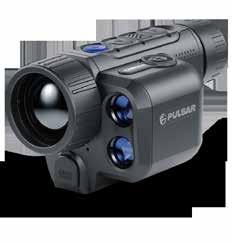
rapid dissipation. Internal heat causes Dark Current
deteriorate image quality and reduces the working life of the internal electronics. Heat build-up can be a problem with thermals that have heat-sinking.
imagers are identical in every way as their larger except for the physical size of the sensor. The high performance optics have a fast f1.0 aperture and are available with a focal lengths of-view, or 50mm for higher detection range. The ability to penetrate fog, rain and foliage is outstanding due to the high sensitivity of the Lynred 17µm sensor. A 12µm
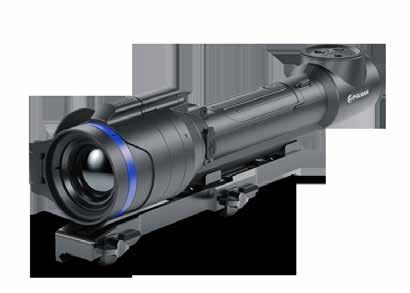
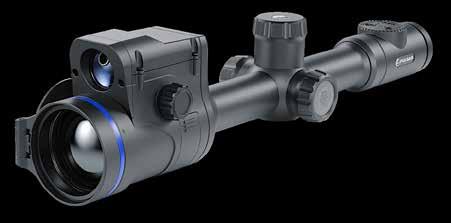
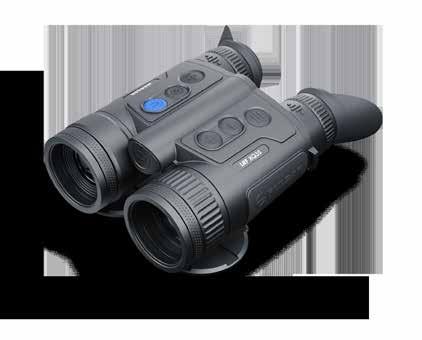
micron sensor simply cannot match this sensitivity due to having a smaller surface area, so this must be considered when deciding which model suits your requirements. Choose 17µm for poor conditions and foliage penetration or 12µm for a higher image resolution image.
When compared to a
same distance performance,
the Pulsar XP50 Pro, but with less distance performance. For most users, the will ever need and is very competitively priced for a European built product that is built to perform and last. See future issues of the News for hands-on reviews of these and other products.
interwoven on their intended journey and subtle changes cause them to make course alterations.
it passes the stern. Speed is required to estimate both distance travelled, distance to go and ETA.
GPS navigation gets us safely to places and saves our special spots, however used their own system, unchanged for thousands of years.
All data is stored inside the head of a master navigator, who has spent a lifetime training and using the stars, sun, moon, currents, wave action, wind, birds and even the taste of the water to destination.
They learn the sea currents and expected variation in wave patterns of all places they intend to travel.
at one with the marine environment, understanding how the elements are
COG (course over ground) is complex and involves an ancient star compass, which they were originally taught on coral sands with shells and a stick. The cardinal points of NESW, as well as four quadrants that fall between each cardinal is divided into 32 houses where a particular star rises in the east and sets in the west as they always rise and fall in the same house. They need to identify and memorise over 220 stars, where the sun rises and sets throughout the year as well as which stars are used to travel to each island. These were learnt through rote, chants, songs and dances.
SOG (speed over ground) is calculated by timing spray from the bow to see when
Their LCD is the night sky along with the sunrises and sunsets. Stars only provide accurate positioning until horizon or dip below this as they set, once outside this zone they defer to the closest stars but need to constantly make mental adjustments. They will use both rising and setting stars to keep on course as well as stars lined up with the port and starboard rigging ropes to ensure they are constantly on track. To measure distance travelled and latitude they identify pairs of stars that travel perpendicular to the meridian line between north and south.
Adjustments are made at sunrise and sunset but cloudy skies forces them to use dead reckoning pointing the angle of the
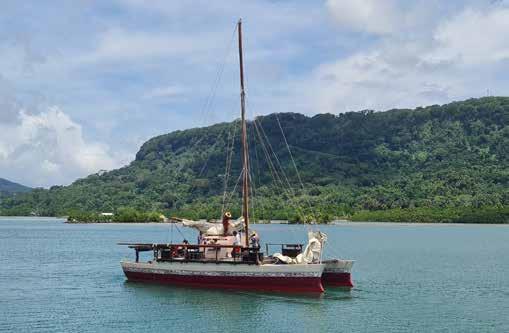
bow into the swell to stay on course until the skies clear. In the past 50 years they have made numerous trips between Hawaii, Easter Island and New Zealand and everywhere in between.
Bloodshot eyes identify the on-board navigator as
they constantly have little sleep and can be woken by a simple change in the motion of the vessel that tells them they are off course.
Mau Piailug, of Satawal Atoll, FSM, was the only one of six remaining Master Navigators prepared to
break the cultural taboo by teaching outsiders this sacred skill. Driven by his strong belief that if not shared it would be lost forever, what he started has resulted in hundreds being taught and the number grows every year.
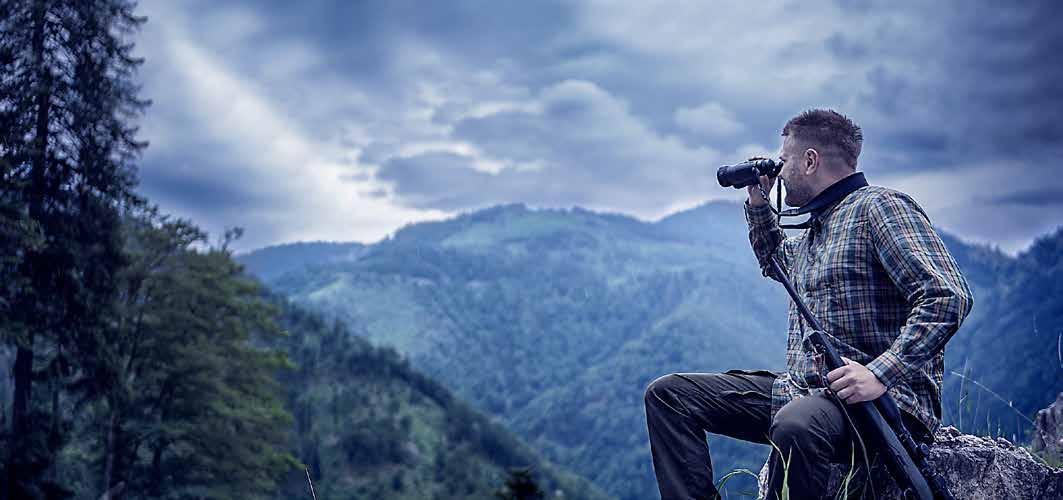
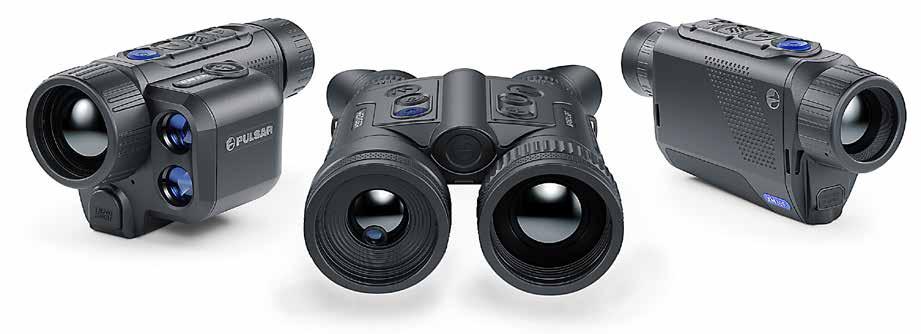
The Pulsar Axion series is a compact and versatile thermal monocular, available with choice of Lynred sensors.
AXION 2 XQ35 PRO / LRF
The new Axion 2 XQ35 Pro has a Lynred 384x288 / 17µm sensor with the highest sensitivity of <25mK for outstanding performance through rain, mist and foliage.
AXION 2 XG35
640x480 / 12µm sensor that produces outstanding image resolution, zooming
The LRF version has an accurate 1000m
Horizontal Distance settings
Professionals choose
and viewing comfort of a classic binocular with the advantages of a thermal imager.
Viewing with both eyes is more natural and causes less eye fatigue. A single accurate distance information
MERGER LRF XP50
Lynred 640x480 / 17µm sensor has and sensitivity of <25mK for better performance through rain, mist and foliage.
MERGER LRF XL50
professional 1024x768 / 12µm sensor for incredible resolution, zooming capability
and affordable thermal monocular, while pocket while walking.
AXION XM30F
Lynred 320x240 / 12µm sensor delivers
for most thermal imaging situations such as stalking, pest control and property security.
Back turned to the ocean,
“Oi mate! That’s a bite, that’s a bite!”
rod doubled over, leaning out to sea. Fish on!
It all started with gathering the right bait. The morning tides were perfect for a dive so I suited up and started hunting the coastline. During the dive I came
most likely someone’s discarded berley or craypot bait. It was crawling with red rock crabs feasting on the left overs. An idea started brewing, “They would make awesome rig bait.” I couldn’t kick a gift horse in the mouth and so I dived down and grabbed a few for an evening surfcasting mission. With those armoured pincers, thank goodness for dive gloves!
Walking down the beach, it was the usual juggle of rods, rod holders, bait bucket, back pack and, just like the groceries, it all had to be done in one trip. My mate change of light, the target species being rig.
I use a simple one hook ledger rig where the single hook can be removed and replaced, which allows me to bait multiple hooks in preparation. I can wind in, check a bait, quickly change it over and continue fishing.
Ultimately this creates more time with your bait in the water, which should increase your success. The first bait I tried was my favourite—crayfish. Casting out, the conditions were almost too calm. An hour passed with not a sniff. A banded wrasse was landed during regular bait checks but it was gearing up to be

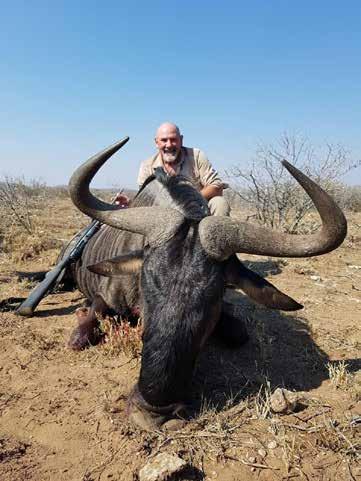 Bryn Williams
Bryn Williams
a scenic trip to the beach. Time to swap to a crab bait. You spend a lot of time staring at rod tips thinking, “Was that a bite?” but, in reality, when a rig takes your bait its often a test of how well you buried your rod holder into the sand.
“Oi mate! That’s a bite, that’s a bite!”
Finally, some action! It was a classic take from a rig, with a strong initial run, pulling drag, out to deeper water.
behind the breakers before trying to land it. The surf in Kaikoura can be unforgiving with a strong undertow, even on calm days. As a wave drew back, I put some effort in, bringing it up the beach. My mate grabbed the shock leader, taking the pressure off the rod and securing the catch.
This wasn’t the most successful day down the beach, nor was it the best rig of the season, but it was one of the more rewarding catches; being a part of the connection from bait to target species!



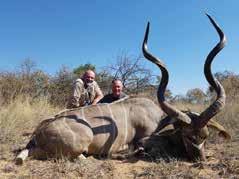
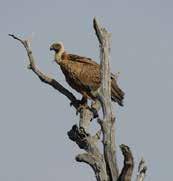
with New Zealand the southern limit of their
do appear around the Top of the South over summer
and detritus sucked off the bottom or the surface of aquatic plants.
Fourteen year old Sam Bode Mitchell is not only
Nelson’s Tahunanui Beach and was surprised to hook this good grey mullet— certainly a rare catch on a rod. And a lot of fun. A tenacious battler, it put up a
to his backing more than once.
Grey mullet or kanae are a prized food by Māori because of their meaty oily texture. They smoke up beautifully.
Needless to say, Sam was delighted with his catch, especially since it was himself.

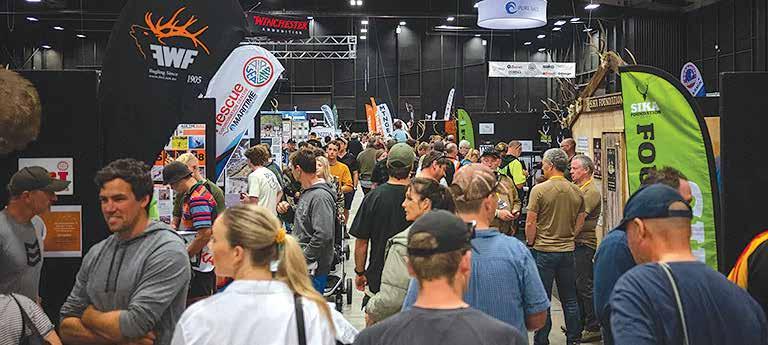
Show is New Trade Show plus annual
Originating in Taupo in 1993 at the Spa Hotel it has since grown exponentially over the years and is now held at Mystery Creek in Hamilton to accomodate the large capacity it requires. Last year at the shows
Creek there were over 165 Exhibitors and just under 10,000 attendee’s, with this coming years event set to be much bigger again with extremely positive feedback from the event spreading like
With a huge array of amazing exhibitors and

products all showcased undercover, multiple stage demonstrations from butchery, head skinning, game cooking and hand held thermal display, annual roaring comp, NZ duck and goose calling goat hunting competition registration point, a massive food court, unlimited free car parks available and lots competitions and things to do for the kids as well it makes for a great family outing and community atmosphere so for anyone that is interested in hunting, taxidermy, outdoor equipment, camping, tramping, game food, 4x4 or offroad vehicles, conservation, back country or hunting art, outdoor adventure based in any shape or form the Sika Show is the NZ event not to be missed!
There is also our amazing door prize “The Ultimate Hunt Package” valued at over $24,500 plus over $50,000 of prizes in the head competition up for grabs, a $1500 SPIKA clothing voucher to be won just by purchasing your ticket online at www.sikashow.co.nz and many other spot prizes drawn throughout the show.
We have multiple initiatives with the proceeds going to the Sika Foundation, NZ Tahr Foundation, Rural Support Trust and the Greenlea Rescue Helicopter in Taupo.
With so much to see and do, a massive prize pool to be won and bargains to be had get your tickets to one of NZ’s most popular events and immerse yourself in everything outdoors that NZ has to offer.


surprise. In this case, about
and a couple of well, BIG
I’ve never really been keen on catching eels. River ones are slimy and have snuck up waist deep water. Frankly, they scare the proverbial out of me!
When I started my chef’s
apprenticeship, I learned to smoke them and even enjoyed eating them. Fast forward to 2022 and a
We were chilling out during a quiet spell when I looked up and the rod bent over.


The rod holder was canted about 35 degrees and sinking lower. I rushed over just in time to save it as about 50 locked up and tightened the tension a bit more. It really buckled over. “Damn,” I thought, “what the hell is that?”
We had set it a couple of hundred out with the drone and I gained 100 metres of line back. Then it was off again, not really head shaking, just pedal to the metal. I really had to hang onto the rod, as it was pulling hard. You could feel the power but we were still none the wiser what it was. We gained line lost and the bursts slowed down.
Now it was in the back set of waves and the rod was still buckled over. It found under the waves at Macktruck power. The water erupted behind the waves, but we still couldn’t see it. Finally, a good wave and in it surfed—a conger eel. I wasn’t sure if I was excited or disappointed but, damn, it was long and solid as hell. I don’t like touching them, so I yelled at Tash, “GO GRAB IT!”
To my surprise, she did. Rod now in the holder, I went to assist. It was heavy, long and, to my surprise, not even slimy.
Now I was being brave and picked it up but struggled to get the tail off the ground.
As I positioned for a photo, the jewels! No warnings— just whack! Yes, it was funny as, but it did hurt the pride more than the jewels.

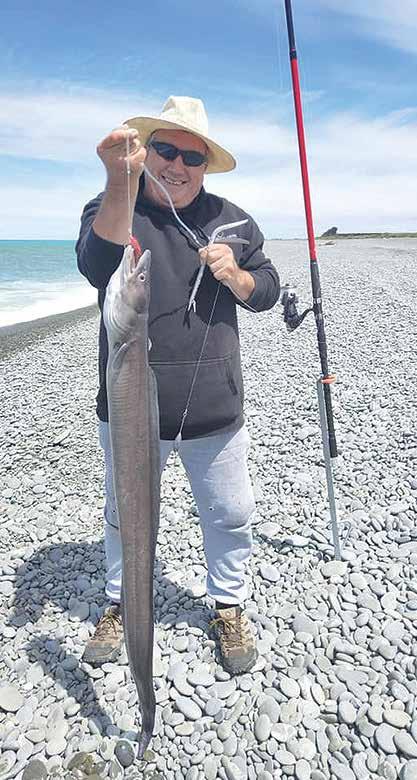
I fell backwards and let it go. It was slashing around on the beach. Wanting to release it, I got two hands behind its head—the rest dragging between my legs as I walked it to the waves— when whack, the tail leapt off the ground, just missing the jewels again. This time it came up my back and smacked me on the back of my neck, like an open hand slap but with added power to boot. I dropped the eel, had a giggle, another grab and another day.
Tash was videoing it so if you want a giggle at my
expense:
https://vt.tiktok.com/ ZSLkjesFT/ https://vt.tiktok.com/
A couple of weeks later we got a smaller one, which we smoked.
I mixed up canola oil, crushed garlic, grated ginger, paprika, small amount of chilli powder, honey, little soy sauce and golden syrup. We use a hot smoker with up twice to give it a good smoke. It was nice fresh out of the smoker.

No wonder it hurts when you get bitten by and eel, check out these teeth

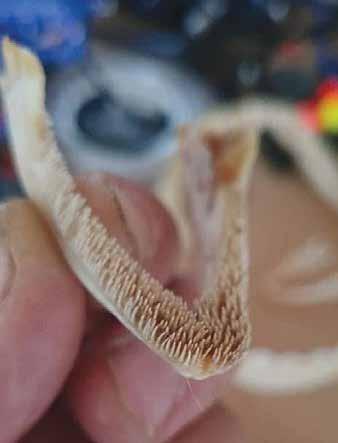









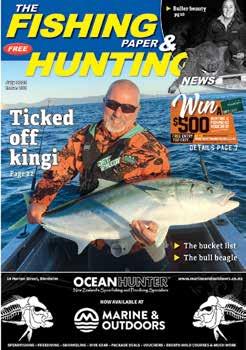










The Fiordland Marine
interests, Iwi, local and
“Our mahi is focused on identifying environmental effective ways to mitigate those risks,” says Chair of the Guardians, Dr Rebecca McLeod.
“The integrated approach to management of this incredible place came from the community and to this day the Guardians consider the community holds the answers to its effective management.
– we are managing it for the future, not just the present day. Those original Guardians were real visionaries and so as much as anything we are trying to do them proud.”
The Guardians arose during the 1990s when some locals came together to express their hopes and concerns about the future marine environment. Their discussions were often tense until each understood what
the other valued and what they held in common.
The Guardians have been guided since the beginning by a shared vision, which is to maintain or improve the quality of Fiordland’s marine future generations to use and enjoy.
Fish Mainland was modelled on the Guardians’ integrated approach.
Fish Mainland’s Board of Directors includes two of the original Guardians, Alan Key who was awarded the 2014 for his voluntary work
Stewart Bull who continues to serve as a Guardian. Bull was similarly honoured in Service Medal for services to the Māori community and the environment.
The Guardians’ integrated approach to decision making continues. The most recent decisions began in 2022 when the Guardians proposed regulatory amendments to better align them with the philosophy of freezer. These amendments were developed following
sustainability and increased
Fish Mainland, however, had concerns about parts of the Guardians’ proposal with respect to their rationale and likely longterm consequences for
In 2022, Fish Mainland accompanied the Guardians and Fisheries New Zealand meetings in Otago and Southland to consult on the proposals.
“The consultation process worked as it should. The Guardians carefully listened to what Fish Mainland and the wider public had to say their proposals accordingly,” said Alan Key.
“Fish Mainland and the Guardians agree the overriding challenge to improved management of Fiordland is to collect better data on recreational catch and effort. For this purpose, Fish Mainland has promoted and effort data.
Fish Mainland has developed a self-reporting system, aptly named to the South Island blue cod
Randall BessCatch could greatly expand the data available for many those in Fiordland.
During the public meetings about the Guardians’ proposals, recreational Mainland Catch and its mandatory use in Fiordland. The public understands we can’t manage what we don’t measure.”
The Guardians’ advice was recreational self-reporting become mandatory for the Fiordland Marine Area based on the strong support expressed for mandatory reporting. Whilst not accepting this recommendation, the Minister of Oceans and Fisheries has encouraged us to promote voluntary use of the Mainland Catch app” said Dr Rebecca McLeod.
“The Guardians request you download this app and start recording your catch. The data will support our future review of the effectiveness of our recent changes to improve sustainability of key stocks.”
Refer to www.
catch-app


800g – 1kg tahr hindquarters
3tbsp
1tbsp Worcestershire sauce
1
1
3
2
3


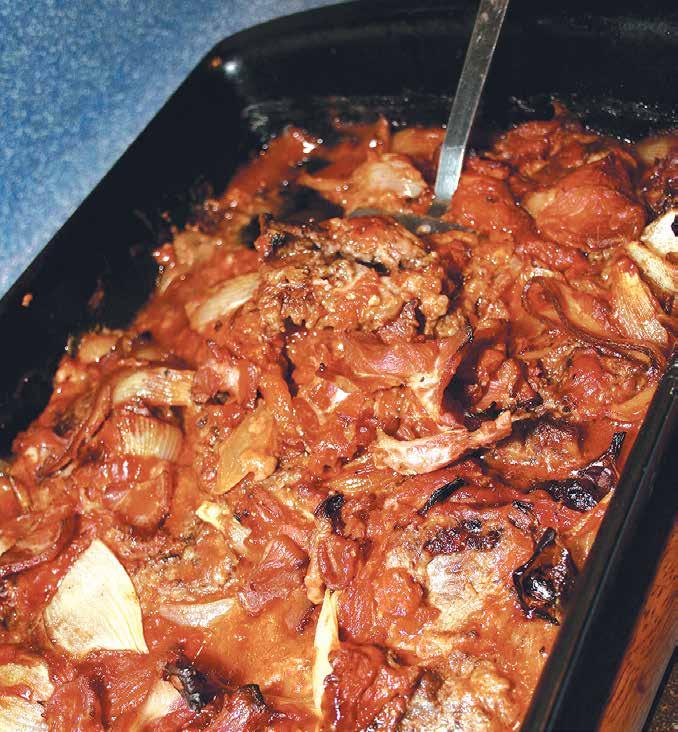



productive at times,
Gear: this place is suitable from hand-lines to surf rods, and robust rod holders are provided. An ideal length
Yutong Wu, a university student, passes on the valuable information he has gathered about
of the rod would be 5-10ft; anything longer will create inconvenience for other anglers and yourself. For your line, it is up to you to decide what the weight should be depending on the species targeted, but I bet
barracouta with 10lb braid. The most common rig is a bottom rig with two or three hooks but remember to change the weight of sinkers depending on the current, which can be very
turbulent beneath. Sabiki rigs usually demonstrate exceptional success. Just use the ones from Black Magic or Hayabusa—I have caught quite a bit of legal-sized
Measurement tools:
two metal measurement plates are installed at this jetty, so please use them. It even labels the legal minimum length of the common catches there. It is quite upsetting to see always a few people taking


undersized ones, especially the blue cod.
Bait: always bring more than just one type of bait! I have tried many different types: fresh mussels, tuatua, cats eye snail, salmon belly, cut baits of kahawai, barracouta, salted bonito and jack mackerel, frozen and salted squid, pilchard, mullet, and crabs, chicken and so on. It depends on what species you are after, but chicken, squid, and pilchard cubes demonstrate consistent success.
Lures: this place drives
I have tried at least 20 different kinds of soft bait, and other types of hard body lures, and every single time, a barracouta is hooked. It was a good sport on light gear, but eventually, I’m just tired of it, so I have moved
My mate has caught some decent kahawai with the silver spoon spinning lure from the Warehouse, so there are possibilities other than a bloody barracouta. many people
rod at Boiler Point. I have caught a few, and those crays love squid. Sometimes there are so many of them, your bait might be gone before a is not an easy job, but the target them all used multiple treble hooks baited with squid and chicken and heavy sinkers. Those anglers strike very hard when the cray gets on top of the bait. Do not forget to measure them before putting them into the chilly bin!
Blue cod: this place is famous for catching blue cod
in shallow depths. I have caught a few of them—the go-to bait is usually squid and shrimp. Blue cod can sometimes be very picky about bait, so again, it is a wise choice to bring multiple types of bait.
Big monsters: if you clearly this is not the place to be, but do expect some heavy bites at times. I have encountered big sharks before but there are better places in Dunedin for such purpose.
Opening time: this jetty is usually open 24/7 but if the wind gusts are too strong, Port Otago will close it without notice. If you still it is a good idea to give harbour control a call to see if the jetty is open to avoid disappointment.
Hardback, jacketed book with 324 pages from Bateman Books.
RRP $59.99.
Reviewed by Cameron Reid.
stories and anecdotes, but well researched book on
This very impressive book has literally been years in the making! During Henderson’s meticulous research he contacted renowned Taupo photographer and author John Parsons (1926 – 2014). This led to a sharing of ideas with a number of Parsons photographs featuring in the book.
Henderson has been a trout

years, and his passion for the sport, and the depth of his research shows within the text of the book. Covering the development of the
century, when trout were still being established within Taupo waters, the trophy years prior to, and between both World Wars, the

and restoration measures utilised to bring it back, the construction of the Tongariro hydroelectric power scheme, and the conservation issues
practices that resulted, this book has it all. While being based in
Nelson, I have travelled and other Taupo tributaries multiple times. And after having read this book, it will enhance my enjoyment of future trips, with a better understanding of the
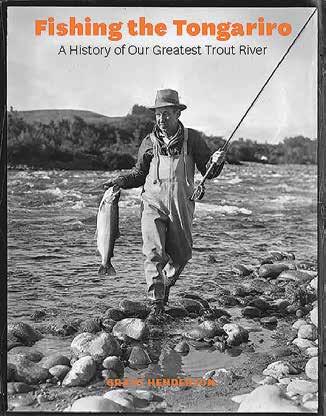
the history of the river, and its place in the world as a destination.
To be honest, this type of book isn’t my preferred reading, I like to get my teeth
series of stories, following a fellow trout anglers adventures. But all in all, this will be a valued addition to any New Zealand trout
Cape Reinga is the most northern part of the motu, and Fisheries New Zealand has Honorary Fishery O cers (HFOs) volunteering their time to protect shared fisheries at this pinnacle part of the country.
Daniel Leef started patrolling in Kaitaia area of the far north in 2020. He’s also one of our youngest HFOs at 27 years old.
The Kaitaia patrol catchment area spreads from both the West and East coast, including from Hokianga on the West Coast
and Whangaroa Harbour on the East Coast and in all the area leading directly up to Cape Reinga.
There’s a whanau connection to Daniel being an HFO in that he is following in his father’s footsteps.
“My father has been an HFO for 12-years, so I had some insight into what I was getting into. The main area I cover is from the West Coast from Whangape Harbour to Cape Reinga passing 90-mile beach. Ahipara is a popular place to fish and dive so I spend a lot of time there.“
Daniel is also a volunteer at the Kaitaia Fire Brigade – a role he juggles with his voluntary work as an HFO.
Public service fills a big part of Daniel’s paid working life. He’s a qualified ambulance o cer and used to work for St John Ambulance. These days he works for New Zealand Police in the Northern Emergency Communications Centre.
“I started with St John when I was 18 and became the youngest qualified Māori
o cer in Kaitaia. My iwi is Te Rarawa and my hapū is Ngati Haua, so that was a proud moment.“
And as he explains, his professional work experience benefits his voluntary work.
“The high-risk situations and traumatic incidents that I was exposed to while working on the ambulance actually prepared me well for a range of situations, including with police where quick decision making, confidence and empathy are needed in handfuls.

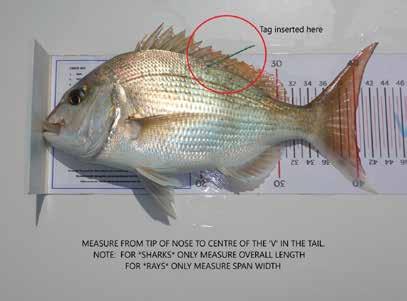

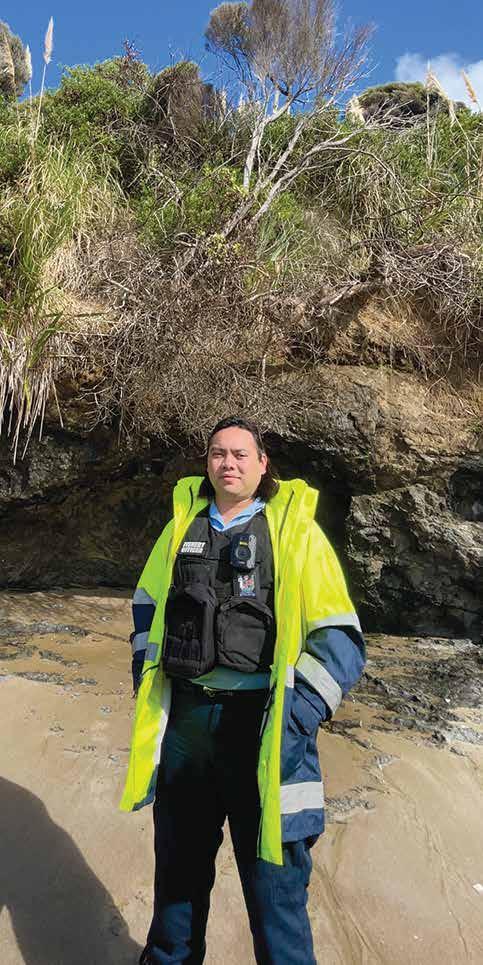
“I patrol as an HFO in the same region where I was when working for St John. I’m a familiar face in the community. I often see this shine through where even some of the rough diamonds recognise me. There can be confronting situations from time to time as an HFO and my previous experience generally helps cool things down.
Probably the most common scenario I come across is fishers with too much pāua. Often people deliberately taking too much pāua or a prohibited shellfish species will try to hide their catch.
and fisheries resources in the area. On the water, we’re well equipped to be able to conduct sea patrols in our new vessel rightly named ‘Te Hiku’, representing the name of our region in Te reo. About half of my patrol work is done with employed Senior Fishery O cers, so the experience I get is invaluable.“
Outside of his voluntary and paid work, Daniel also enjoys casting a rod into the ocean and diving.
“Absolutely. Fishing and diving are my favourite outdoor activities. I’m an ocean boy and I have a favourite Spot X near my home at Whangape, just south of Kaitaia. It’s a quiet place to recoup and relax after the high intensity of the roles I play. I live a busy life but would encourage anyone thinking of being an HFO to give it a go as it opens opportunities.“
If you have questions about becoming an HFO, email HFO@mpi.govt.nz

There’s no typical day out on patrol in the Far North. The areas we go to are often isolated. It can be anything from checking catches at easy access boat ramps to rocky or soft sandy beaches. We talk with fishers and divers, focusing not just on inspections, but also educating people on the rules. From time to time, we patrol with the backup of police and local iwi. The aim is to build a relationship to ensure local kaitiakitanga are also able to help monitor and protect the kaimoana
If you’re unsure of the fishing rules the best way to find out is to download the free NZ Fishing Rules App.

concerned. For about has written to the editor
This must be for one of the bothered with this bullshit,”
If this is indeed the case, perhaps you should all write to Crimpy, which will probably result in him terminating my employment, which in turn will save him the exorbitant fee he pays me each month. I’m surprised he could afford to go to Alaska.
Bloody near every week, at some point on the news, there’s a report of someone either being bullied or being a bully. When I was a kid, which admittedly was a long time ago, a bully was normally another kid who was bigger and tougher than the others.
After I left school at 16 and entered the workforce, which I wrongly thought was to earn for myself and not to pay for those who didn’t have the same ethic, I came to realise there were a
description as well. Cane happy pricks. Now though, a bully can be anyone from a strict parent to an employer who, quite rightfully, asks for a fair day’s work for a fair day’s pay from staff.
Okay, as I think I’ve mentioned before, I’m getting a bit long in the tooth and, consequently, have worked in a lot of jobs under a lot of bosses. In

my last job, I commented on the number of staff
on the wrong side of start time. It appeared to be quite acceptable. I was responsible for half a dozen staff, all of whom were under no illusions that the start
minutes after. They were okay with that. Probably because I told them about
on a construction site, my boss didn’t thank me for turning up on time or ask me nicely if I wouldn’t mind with my day’s work.
It was more like, “Get your arse up to the third level and frame up the changing rooms and have it done by smoko.”
Today he would be a bully, back then just a boss making sure his staff delivered. In my last job I was a unit supervisor in the local government. A young guy was successful in securing a vacancy in my unit from another within the organisation. He was a decent kid apart from the bright red punk/Mohawk haircut. I mentioned to HR this would have to go and they made noises that were almost human.
“You can’t do that; it could be seen as bullying.”
So, I tried diplomacy and said, “There’s no way you’re wearing my unit’s uniform looking like a f#@*ing peacock.”
The haircut went and he didn’t complain I was a bully, quite the opposite.
Okay, there are genuine cases of bullying but to get offended when a voice is raised or they must do something they don’t like, swallow some concrete pills and harden the f#@* up.
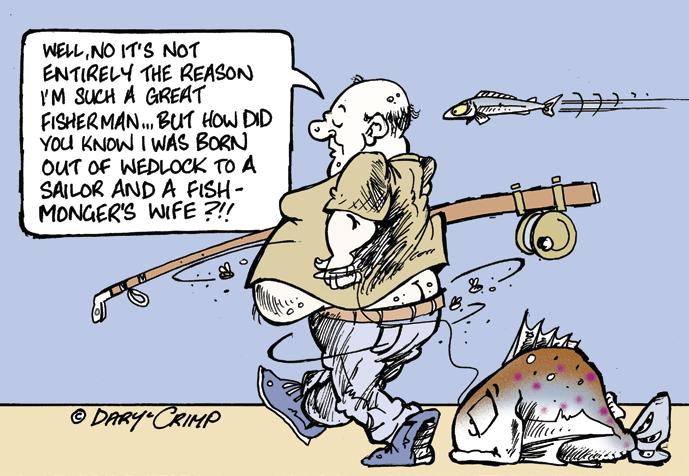
If I had a dollar for every time I’d heard that statement, I wouldn’t have to write this article. The simple truth is, a God-given right is as valuable as tits on a bull if
In other words, access is the key fundamental right we need to preserve… kiss goodbye to access—kiss
bluntly, that threat is real. Circle Monday 9 October on your calendar
Nelson City Council, with full support of all bar three of its elected councillors, has forced the Delaware Bay Access Group into the Environment Court to defend your right of access. The hearing is set for Monday 9 October in Nelson and will determine the legality of driving vehicles on the


foreshore to launch and retrieve boats near Bishops Peninsula at the end of Māori Pa Road—a right that has existed since before the gazetted!
But why should you worry about Delaware Bay?
Chances are, like me, you don’t even launch there. The answer is simple: Monday 9 October is a ‘Tits on a bull’ moment!
Thousands of launch sites could go
This is no longer just a Delaware issue, because a loss in court will set a legal precedent that could require ALL unregistered and unformed beach launching sites throughout New Zealand to have Resource Consent—imagine that bureaucratic quagmire. Kiss goodbye to unfettered access to our public resources;
worthless if you can’t get to them!
The Delaware Bay Access Group has presented a
far more comprehensive, thorough, and reasoned legal submission to the Environment Court than either Nelson City Council or Iwi, WITHOUT the resources of the others.
Remember, Nelson City Council has used your rate payer money against you! However, we need a further $20,000 dollars now to see this through on your behalf.
How much is your fishing worth to you— really?
While many have donated already, and some repeatedly, the bulk of the money raised to get us this far has come from
individuals who have put in thousands of dollars each - including Fish Mainland (Interestingly, none of the principal donors launch boats there). To put it into perspective and demonstrate the scale of what we are up against, at a public meeting we attracted around 150
and are passionate about saving access. We raised $500, which was greatly appreciated. However, far more was spent over the bar on beer, that night!
In the past year alone, this process has cost the Delaware Bay Access Group approximately $25,000! Step up and help us finish this fight
We appreciate that many have already donated but we still need to raise $20,000 by 10 Sept to present our legal challenge in court—what are you prepared to give?
Please pay your donation to: For other forms of help, please email
and businesses to give generously.
